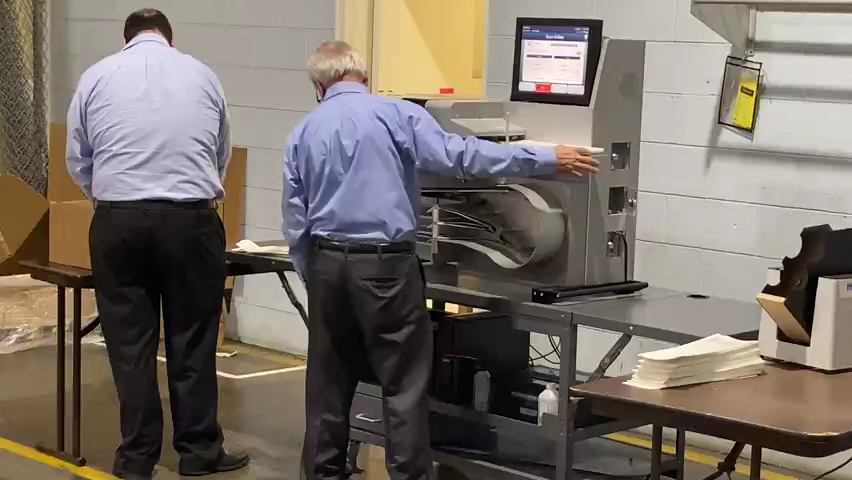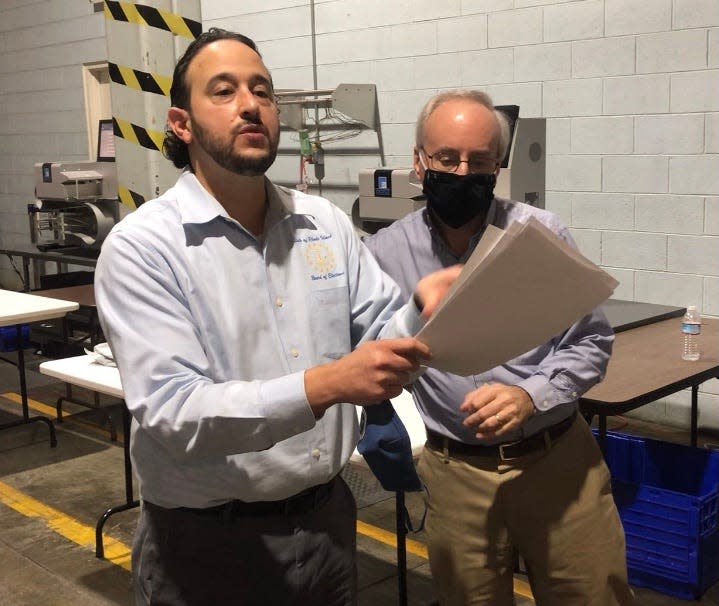On Election Day, Rhode Island's votes were counted fast. Will that change?
A mere hour after polls closed on Election Day, while many states were kicking off days of ballot counting, Rhode Islanders watching closely knew who would win all of the key statewide and federal races, including the ultra-competitive 2nd Congressional District battle.
News organizations were able to call races (and meet deadlines) at hours that a few years ago would have been considered unthinkably early and get a head start formulating their post-vote takeaways.
It hasn't always been so fast.
Rhode Island's rapid election reporting is partly a consequence of its ultra-compact geography and the centralization of its elections bureaucracy compared to larger states where counties play a big role.
And it's partly because of decisions Rhode Island officials made a few years ago that turned it into the only state in the country where 100% of voting machines transmit results wirelessly.
The vote-scanning machines into which voters feed their ballots, called DS200s, have modems beam results directly from local polling places to the state Board of Elections headquarters in Cranston, where they are then posted for the public.
The modems were hailed as a major technological upgrade when Rhode Island Secretary of State Nellie Gorbea leased the current voting equipment before the 2016 election.
But after Russian interference in that presidential vote alarmed officials throughout the country, they've become a potential liability as well.
Any information technology system that is connected to the internet for any period of time theoretically can be infiltrated by cyber criminals or terrorists.
So, after 2016, some states and counties that had connected equipment took them offline and went back to delivering results by phone or in person. (In several states, some counties use modems to transmit results, but it is not done statewide.)
Rhode Island officials also were concerned.
Fearing hackers in the run-up to the 2020 presidential vote, the state Board of Elections investigated the modem question while preparing for a needed upgrade from 3G to 4G. The board asked information technology professionals for advice and the National Guard for help.
Ultimately, they decided not to try to change equipment or remove modems from the scanners, but came up with a cybersecurity plan that they believe protects the system from potential infiltration or tampering.
2022 RI Election results:5 takeaways from the November 8th general election

It includes disconnecting equipment from the network at all times except when being tested or transmitting results after 8 p.m. after an election, changing passwords before every election, using 256-bit encryption for tablet poll pads and USB stick backup for all machines.
Still, concerns remain.
Last year, the U.S. Election Assistance Commission issued new guidelines recommending that election results not be transmitted over the internet.
Some voting security advocates believed they had not gone far enough and warned of new hacking risks to modem-equipped machines.
All of this raises the question as to whether the voting system that worked so well and so quickly this month is living on borrowed time and must be replaced eventually with something slower and more old-fashioned.
The state's eight-year, $5-million equipment lease for its DS200 voting machines expires at the start of 2024. The contract includes an option to purchase the machines for $1, but the $4 million software license and maintenance deal also expires in January 2024.
This means that before the next elections, probably sometime next year, officials will have to decide whether to keep the current system or go in a different direction.
The state Board of Elections appears satisfied with the current arrangement, although it hasn't ruled out a change.
"These modems are only connected to our network for approximately 30 seconds, when results are transmitted from polling locations around the state to the Board of Elections," the board stated in an email. "We have never experienced any cybersecurity incidents using this system. We also have redundant backups including the ability to receive physical memory sticks with vote tallies from the machines as well as the physical ballots cast, which serve as the bedrock of Rhode Island’s election system."
Without the modems to transmit results, the elections panel says Local Board of Canvassers "would have to run the USB drives" with results "from the precinct DS200 and early voting DS200s to the BOE's headquarters."
"The results being posted to the BOE website would be significantly slower," Board of Elections spokesman Chris Hunter wrote.
But others say the added security that comes from not transmitting results is worth the added time.
John Marion Jr., executive director of Common Cause Rhode Island, said the state is an "outlier" when it comes to transmitting election results by modem.
"When the manufacturer delivered the very same machines to Maryland, that state's Board of Elections made the manufacturer remove the modems and reimburse the state for their added cost," Marion wrote in an email. "Alabama, California, Colorado, Maryland, New York, North Carolina and Virginia have banned the use of modems in ballot tabulators. Recently Michigan stopped certifying machines that include modems."
"Common Cause Rhode Island continues to believe that the presence of the modems is not worth the added risk," Marion wrote in an email. "In all likelihood eliminating the use of modems will marginally slow down results reporting. But it's worth noting that we are the smallest state in the country geographically and the only state that uses modems in every polling place. Many states much larger than Rhode Island reported results in a timely fashion on November 8th."
Secretary of State-elect Gregg Amore, who will take over managing elections equipment next year, said: "By and large, our elections run extremely well in Rhode Island."
However, "while there have been no issues with this method of transmitting the results, we know that this has been the one flag that cyber experts have recommended we discontinue," Amore said in an email. "It is our goal to explore other ways of ensuring timely and accurate reporting of election results and to discontinue transmitting those results by modem.”
Breakdown by city and town Rhode Island Live Election Results
A deer in Bristol
The Board of Elections broke out the 12-sided dice on Monday and conducted its post-election "risk-limiting audit" of results, which found no discrepancies. It certified the officials results of the election the next day.
But, for the record, not everything went smoothly on Election Day.
As voting unfolded, the Board of Elections' executive director, Robert Rapoza, told board members something was happening in Bristol:
"At the Quinta-Gamelin [Community Center] polling place, there is a large deer that was blocking the entrance and was hindering the voters from going in," he told the board diromg ots 9 a.m. Election Day meeting. "Subsequently the police have been called to address that situation."
2020 write-in results
When discussing the speed of this year's vote count, it's worth mentioning that there are still some results from the 2020 election that have yet to be released — the write-ins.
Each year, whether out of a sense of frustration or mischief, some voters decide to write in names with no reasonable chance of being elected. Mickey Mouse has been a popular option for decades, as have sports stars such as Tom Brady.
State law requires the Board of Elections to tabulate and report totals for all candidates receiving five or more votes in each election. (Names that receive four or fewer votes are reported "as a composite total of all write-in votes for each office.")
Traditionally, the board has published write-in vote totals in its Countbooks, the hundreds-of-pages long official tally of votes for every office in every city and town.
But in 2020, the board didn't make a formal Countbook. It noted that all of the results are now broken down online. All of the results, that is, except the write-ins.
In 2019, the board backed legislation that would have required write-in candidates to declare their intent to run before the vote if they wanted to be counted. That would have relieved the state of tabulating results for Disney characters, dead politicians or any other entity not actually running for office.

In a letter to lawmakers supporting the bill, the deputy director of elections at the time, Miguel Nunez, called tallying write-ins a "monumental responsibility" for both the state Board of Elections and Local Board of Canvassers. He said 31 states, including Massachusetts and Connecticut, have some form of "notice-of-intent" rule for write-ins.
But the bill was opposed by the American Civil Liberties Union, which argued that refusing to tally write-ins violated the will of the electorate and the notion that every vote should (literally) be counted.
After passing the House, the 2019 bill, introduced by Rep. Camille Vella Wilkinson, died in the Senate.
Asked when or if the board plans to release the tally of 2020 write-ins, spokesman Hunter was unable to provide a timeline.
He said the tabulation of 2022 write-ins started last week and often takes up to six months to complete.
Even write-in enthusiasts acknowledge that counting the number of people who think Bugs Bunny should be attorney general (six in 2018) has more humor value than anything else.
They often show which candidates who were knocked out in the primaries have die-hard fans willing to write them in for the general election. And they can offer a sense of the celebrities who are trending locally.
Brady received 22 votes for attorney general in 2018, while he was a quarterback for the New England Patriots, but left for Tampa Bay before the 2020 vote.
No Boston Red Sox players received write-in votes in 2018 even though they had won the World Series that fall.
More:RI gun-control lobby buoyed by election wins
This article originally appeared on The Providence Journal: Will security concerns slow down Rhode Island's speedy vote count?

